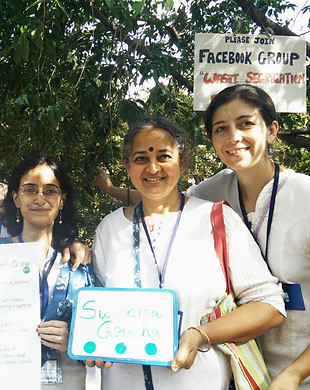Glamorous Garbage Girl with roads less travelled on Waste
July 21st, 2019 | Claire Rao
Trending Articles
Huge Waste problem has simple solutions
The way I looked at waste drastically changed in Bangalore in 2011 when I saw my coffee pods crushed on my own street. I realised my mixed garbage bag was not going very far, I then I asked myself the question “What can I do as a citizen to make a change”. This is when I met Vani Murthy coincidently, from whom I quickly learnt to convert my kitchen waste into black gold for my garden . Together with a few other engaged citizens, we formed a local group in Malleswaram to sensitise people about the waste problem.
We started doing a road show every Sunday on segregation of waste at source, composting and zero waste practices. We were called the Glamorous Garbage Girls and we were like rebels, getting organised to make sure our segregated waste was collected. I even used to carry my plastic and paper waste once a week on my cycle to Dr Meenakshi Bharath’s house till door to door collection of segregated waste became mandatory in September 2012. I later joined the SWMRT (Solid Waste Management Round Table) working with the municipality and the decision makers. Successful campaigns came up with 2bin1bag for segregation at source of waste into 3 categories (organic, recyclable and reject), Swachagraha for individual and community composting, Green the Red for sustainable menstrual solutions.

Trashonomics - A simple guide to learn about waste
After interacting with lots of children during the different workshops, I realised that the problem was really about awareness at a young age. So in 2016 Archana Kashyap and I wrote a book for middle school children called Trashonomics, which is now available in 4 languages. It is a well-illustrated and simple guide to learn everything about the waste problem and its solutions, to be used during school workshops to make kids aware of the problem and simple solutions. We have also explained the important role of waste pickers, who are doing us a great favour by collecting our garbage everyday. They are slowly getting recognition from people and dignity with clean segregated waste in separate containers. We hope the day will come where they won’t have to search in a pile of mixed garbage to get some valuable waste that they can sell. My journey in Bangalore has been very inspirational, working with amazing eco warriors; I must say the citizens’ engagement in that city is unique. This is where I truly learned the importance of the valuable lesson of Gandhi “Be the change you want to see in the world".
I have now moved back to France after 11 years and I have become ever more preoccupied about the global waste situation. I am now able to see the big picture. The amount of waste generated is much higher in so called western countries and it is a lot about visual cleanliness than proper disposal. in countries where citizen are paying heavy taxes they assume it is the job of the government. The 1 euro charged by shopkeepers for plastic carry bags is not an incentive to reuse - I see people using these to dispose of their waste. Often people think investing in exorbitant mechanised equipment is the solution. The transport / export of waste is expensive and a highly ridiculous exercise. I have learnt how simple local solutions with manpower are more efficient, not only creating sustainable employment but also preventing dumping and incineration of waste. People still see recycling as THE solution but even that is not done properly. In France only 20% of waste gets recycled. The Zero Waste movement is slowly growing and local groups are doing a fantastic job of creating awareness with the support of Zero Waste France.

Reduction of waste and going back to basics
Though this is perceived as utopist in this consumer driven world where TV, radio, social media are continuously harassing us with advertisements, it helps to think before buying something new. Repair cafés are mushrooming in every city and many second-hand shops and garage sales are easily accessible. Most of the things I have in my house are second hand - from furniture to crockery to clothes to my cycle. In the village I live in, the reject waste and lots of valuable waste goes to a nearby incinerator. With a local organisation we are starting a project of collection of organic waste on a delivery tricycle from fruit and vegetable vendors. It will be composted in a local park as a demo to the public to be used directly to feed the soil to grow food - a simple way to reduce our carbon footprint.
As an aware and responsible consumer, since that is the way I consider myself in this global world, I see only advantages in moving towards reduction of waste: going back to basics, simplifying the number of products we use, slowing down, reconnecting with people, and last but not the least - actually saving money. After mismanaging waste for so many decades, few municipalities are showing the way, promoting on-site composting, helping families with reusable nappies, and supermarkets selling unpackaged groceries and produce.
I have chosen to take the road less travelled with the support of my family, not going back to a traditional career. I am grateful to all the people I have met during this journey - they have helped me reconnect to Mother Earth, and I believe in the permaculture principle of taking only what we need and sharing what we have in excess.

The author of the story is “Claire Rao" and you can reach out to her athttps://www.trashonomics.in
InwasteR is only a platform to share WaStory and the views and experience are purely of the author.

